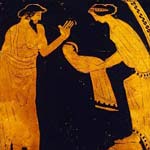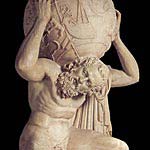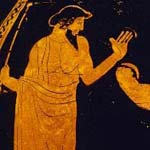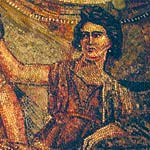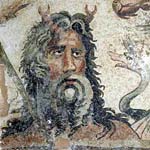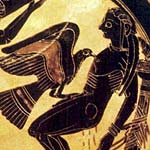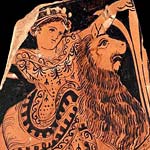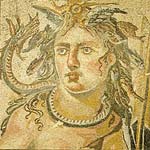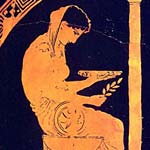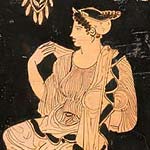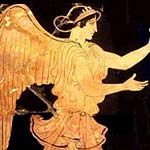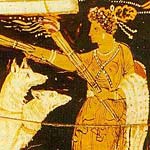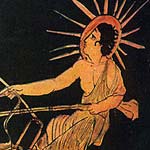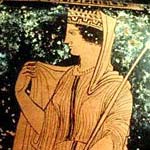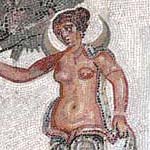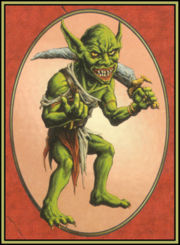I. MAJOR TITANS : THE URANIDES & IAPETIONIDES
The most important of the Titan gods were the twelve Uranides (Cronus, Oceanus, Iapetus, Hyperion, Crius, Coeus, Rhea, Tethys, Theia, Phoebe, Themis and Mnemosyne) and the four Iapetionides (Atlas, Prometheus, Epimetheus and Menoetius). Of these only the eight depicted below appear in ancient art.
|
|
|
|||||||||||||||
|
|
|
|||||||||||||||
|
|
|
|||||||||||||||
II. MINOR TITANS : THE HYPERIONIDES, COEIDES & CREIONIDESMany of the children and grandchildren of the Titans also bore the name of Titan. These included the Hyperionides (Helius, Selene and Eos), the Coeides (Leto, Asteria and Hecate) and the Creionides (Pallas, Astraeus and Perses). The last three were obscure and do not appear in ancient art. |
|
|
|
|||||||||||||||
|
|
|
|||||||||||||||
A COMPLETE LIST OF TITANS & TITANESSESPindar, Pythian Ode 4. 290 ff (trans. Conway) (Greek lyric C5th B.C.) :"Does not even now great Atlas struggle to bear up the weight of heaven, far from his fathers’ land and his possessions? But almighty Zeus set free the Titanes for as time passes and the breeze abates, the sails are set anew." The Titans were an elder generation of gods who ruled the cosmos before the Olympians gods came to power. They were responsible for the original ordering of time and the establishment of fixed heavenly cycles. The eldest of the Titans--Cronos and his four brothers, Crius, Coeus, Hyperion and Iapetus--were imprisoned in the stormy pit of Tartarus by Zeus after he was victorious in the War. Many of the younger Titan gods, however, allied themselves with Zeus and retained their divine rights under the new regime. Some of these allies later proved to be rebellious and were sentenced to harsh punishments, such as Atlas who was condemned to bear the heavens, and Prometheus, who was chained to a rock and an eagle set to feed on his liver. The female Titans or Titanides remained neutral in the War, and retained their positions as prophetic goddesses. Several of these goddesses became consorts of Zeus and received a place on Mount Olympos as mothers of the gods. ADANUS (Adanos) An alternate name for one of the elder Titan sons of Uranus. ANDES An alternate name for one of the elder Titan sons of Uranus. He was perhaps the same as Hyperion. ANCHIALE (Ankhiale) A younger Titan goddess who perhaps represented the warmth of fire. She was the wife of Hecaterus and hte mother of the metal-working Dactyli. ANYTUS (Anytos) One of the younger Titans or Curetes. Anytus was an attendant of the goddess Demeter who fostered her Arcadian daughter Despoine. ASTERIA A younger Titan goddess whose name and genealogy suggest presided over the night, stars and nocturnal prophecy. She was the mother of the goddess Hecate. After the fall of the Titans Asteria was pursued by Zeus and but leapt into the sea to escape him where she was transformed into the island of Delos. ASTRAEUS (Astraios) The younger Titan god of the stars, the winds, and the art of astrology. He was the father of the four directional winds and the five wandering stars (the Planeta) by his wife Eos, the goddess of the dawn. ATLAS The younger Titan god of astronomy and the revolution of the heavnely constellations. He was arrested by Zeus and condemned to bear the heavens upon his shoulders. Homer suggests he was later released from this torment and appointed guardian of the pillars of heaven. AURA The younger Titanis-goddess of the breezes. She was a virgin huntress raped by the god Dionysos. CLYMENE (Klymene) The younger Titanis-goddess of fame and renown. She was the wife of Iapetos and mother of Prometheus. COEUS (Koios) The Titan god of the intellect as his name would suggest. He was also known as Polus (the pole) and probably presided over the axis of heaven in the north around which the constellations revolve. Coeus was one of the four Titan-brothers who conspired with Cronus in the ambush and castration of Uranus. At the end of the Titan-War, he was confined by Zeus in the Tartarean pit. Coeus was sometimes described as leader of the Gigantes, who rebelled against Zeus. CRIUS (Kreios) The Titan god of the heavenly constellations and the measure of the year. He was probably associated with the constellation Aries, the heavenly ram (which the Greeks called Crius). Its spring rising marked the start of the new year, andthe other constellations were said to follow in its wake. Crius was one of the four Titan brothers who conspired with Cronus in the castration of Uranus. He was later cast into the Tartarean pit by Zeus. Crius was sometimes named as a leader of the Gigantes who rebelled against the rule of Zeus. CRONUS (Kronos) The King of the Titanes, and the god of destructive time--time which devours all. He led his brothers in the ambush and castration of their father Uranus, but was himself deposed and cast into the pit of Tartaros by his own son Zeus. Some say the old Titan was later released by Zeus and appointed King of Islands of the Blessed, home of the favoured dead. CURETES (Kouretes) A group of shield clashing Daemones or Titan gods who came to the aid of Rhea to act as guardians of her son Zeus. They were sometimes called Gigantes, and were probably the same as those which Hesiod described as being born from the castration of Uranus. Their sisters, the Meliae, were Zeus' nurses. DIONE A prophetic Titan-goddess who presided over the Oracle at Dodona alongside Zeus. According to some she was the mother of the goddess Aphrodite. EOS The younger Titan-goddess of the dawn. She was the mother of the wandering stars (that is, the planets) and the four directional winds by the Titan Astraeus. EPIMETHEUS The Titan god of afterthought. He was appointed with the task of creating the beasts of the earth, while his brother Prometheus was busy with the crafting of man. Epimetheus was tricked by Zeus into receiving Pandora, the first woman, and her jar of evils into the house of man. EURYBIA A Titan goddess of the power of the sea. She was the wife of the Uranid Crius. EURYNOME (1) The younger Titan-goddess of earth's flowery meadows. She was the mother of the three lovely Graces by Zeus. EURYNOME (2) The younger Titan-goddess of the earth's meadows. She was the wife of the first Titan-King Ophion. The couple were cast from heaven by Cronus and Rhea who wrestled them for the throne. This Eurynome may have been the same as Tethys. GIGANTES The War of the Giants and its combatants the Gigantes were frequently confounded by the ancients with the Titans and the Titan War. Sometimes the Gigantes were represented as soldiers in the army of the Titan-gods, or as rebellious supporters of the deposed Titan Cronus. HECATE (Hekate) The younger Titan-goddess of the ghosts, witchcraft and necromancy. She supported Zeus in the Titan war and so retained all of her privileges. HELIUS (Helios) The Titan god of the sun who rode across the sky in a chariot drawn by four fiery, winged steeds. He was an ally of Zeus in the Titan-War. HOPLODAMUS (Hoplodamos) A Titan, Giant or Curete who with his brothers came to the aid of the Titaness Rhea after Cronus learnt of her deceptions surrounding the birth of Zeus. HYPERION The Titan god of light, and of the cycles of time measured by the lights of heaven -- the sun, the moon and the dawn. Hyperion was one of the four brother Titans who held Uranus fast while Cronus castrated him with the sickle. At the end of the Titan War he was cast into the pit of Tartarus by Zeus. IAPETUS (Iapetos) The Titan god of mortality and the allotment of the mortal life-span. His sons Prometheus and Epimetheus were the creators of animals and men. Iapetus was one of the four brother-Titans who held Uranus fast while Cronus castrated him with the sickle. As punishment he was cast into the Tartarean pit by Zeus at the end of the Titan War. LELANTOS The Titan god of the breezes of the air. His name means "the unnoticed" or "unseen one". LETO The younger Titan-goddess of motherhood, light, and womanly demure. She was the mother of the twin gods Apollo and Artemis by Zeus. MEGAMEDES Another name for the Titan Crios, meaning "the great lord." MELISSEUS The Titan or Curete god of honey. He was one of the protectors of the infant Zeus. His daughters were the god's nurses. MENOETIUS (Menoitios) The Titan god of violent anger and rash action as his name would suggest. Zeus blasted him into Erebus with a thunderbolt, where he became a bondsman of King Hades. METIS The younger Titan-goddess of good counsel. She was an ally of Zeus in the Titan War who fed Cronus an elixir which forced him to disgorge his five devoured children. Later she was swallowed whole by Zeus who had learned that a son born of their union was destined to depose him. Their only child was instead a daughter, Athena, who sprang fully grown from her father's head. MNEMOSYNE The elder Titanis-goddess of memory, words and language. She was the mother of the nine Muses by Zeus. Mnemosyne was also a prophetic goddess associated with the oracle of Trophonius in Lebadeia. MUSES ELDER (Mousai) Three Titan goddesses of music and song. One of them, Mneme (Memory), was the mother of the nine younger Muses by Zeus. MYLINUS (Mylinos) A Titan or Giant of the island of Crete who was destroyed by Zeus. His name means "he of the grinding millstone," and he was perhaps the same as Cronus "time." OCEANUS (Okeanos) The Titan god of the earth-encircling, fresh-water river Oceanus. As a Titan god he presided over the rising and setting of the heavenly bodies : the sun, the moon, the stars, and the dawn. His ever-flowing waters, encircling the edges of the cosmos were associated with the neverending flow of time. Oceanus was the only one of the brother Uranides not to participate in the castration of their father Uranus. In the Titan-War he remained neutral, giving his tacit support to Zeus. OLYMBRUS (Olymbros) An alternate name for one of the elder Titan. He may be the same as Olympus the Cretan mentor of Zeus. OLYMPUS (Olympus) A Cretan Titan or Giant who mentored Zeusin his youth. He later roused his kin in an uprisal against the god but was destroyed. Olympos (whose name may derive from a word meaning eternal time) was perhaps the same as Cronus or Olymbrus. OPHION The eldest of the Titan gods whose brother Cronus wrestled him for the throne of heaven and cast him down into the Ocean-stream. He was probably the same as Oceanus, or perhaps Uranus. OSTASUS An alternative name for one of the Titan sons of Uranus. PALLAS The Titan god of warcraft and the military campaign season. Some say Athena defeated him in battle and crafted her aegis-cape from his goatish skin. PERSES The Titan god of destruction, and perhaps of summer droughts whose name means "the destroyer." Like his daughter Hecate, he was probably associated with the dog-sta r: the source of scorching heat of mid-summer. PHOEBE (Phoibe) The elder Titan-goddess of intellect and prophetic goddess of the great Oracle of Delphi. She was the grandmother of the god Apollo. PHORCYS (Phorkys) The old man of the sea was sometimes named as one of the six Titan sons of Uranus. POLUS (Polos) The Titan god of the axis of heaven ("polos"). He was usually called Coeus. PROMETHEUS The Titan god of forethought and the creator and benefactor of man. He defied Zeus on several occasions, including tricking the gods out of the best share of the sacrificial meat, and stealing fire from heaven for the benefit of mankind. Zeus was furious, and had Prometheus chained to Mount Caucasus, where an eagle was set to devour his ever-regenerating liver. The Titan was eventually released from his tortures by Heracles. RHEA (Rheia) The Queen of the Titans and goddess of female fertility and the mountain wilds. She saved her son Zeus from the maw of Cronus by substituting the child for a stone wrapped in swaddling cloth. The Titan had devoured her other five children, but these were later freed from his beely by Zeus. SELENE The younger Titan-goddess of the moon. STYX The younger Titan-goddess of oaths of allegiance and of the deadly, netherworld River Styx. She brought her children Victory, Rivalry, Force and Power to the side of Zeus at the start of the Titan-War. SYCEUS (Sykeus) A Titan or giant who fled from Zeus in the course of their war against the gods. He was hidden by his mother in the earth in the guise of a fig tree or its sprouting seed. TETHYS The elder Titan-goddess of the sources of fresh-water. She was known as the great nurse ("tethis") of life, and was sometimes equated with Thesis, the goddess "creation." Tethys spawned the Rivers, Clouds and Springs. THEIA The elder Titanis goddess of sight and the shining light of heaven ("aither"). She was the mother of Sun, Moon and Dawn. Her name is also connected with words meaning "foresight" and "prophecy". THEMIS The elder Titan-goddess of the natural order, divine law and tradition. She was also a goddess of the oracles of Dodona and Delphi. By Zeus she was the mother of the goddess Fates and of the Seasons, and had a seat by his side on Olympus as advisor. TITAN A Titan god who instructed mankind in the observation of the stars and establishment of the natural or farming calendar. He was perhaps the same as Atlas. |
